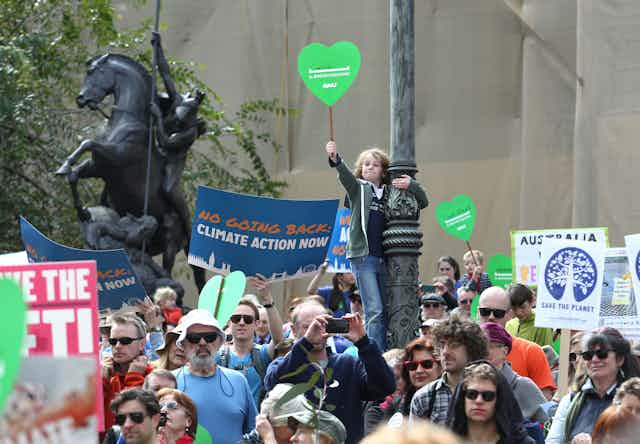More than 60% of Australians support strong action on climate change, according to a survey by the Lowy Institute ahead of the Paris climate summit.
With opposition leader Bill Shorten having added his voice to those calling for deeper cuts than Australia’s current target, the government could pledge stronger action in Paris without significant political damage at home.
The poll underlines the continuing upward trend in public concern about climate change, which has been evident since 2012. That year marked a low point in public concern, corresponding with the entry into force of Australia’s “carbon tax”.
A contrary bunch
But over the past decade, another trend has been evident in public attitudes towards climate change in Australia: namely, that public support for strong climate action has typically been inversely related to the position of the federal government of the day.
In other words, Australians seem less likely to support climate action when governments outline a commitment to strong action, and more likely to support it when when Governments appear reluctant to take the issue seriously.
The Lowy Institute’s annual survey of Australian attitudes to the world broadly illustrates this trend. Since 2006, it has presented Australians with a choice of phrases to sum up their attitudes to climate action. Here are the phrases, followed by a graph of the responses:
Global warming is a serious and pressing problem. We should begin taking steps now even if this involves significant costs
The problem of global warming should be addressed, but its effects are gradual, so we can deal with the problem gradually by taking steps that are low in cost
Until we are sure that global warming is really a problem, we should not take any steps that would have economic costs
When it was first put to Australians in 2006, a large majority (68%) agreed with the sentiment that global warming is a serious and pressing problem. At the time, the then prime minister John Howard was maintaining the position that Australia would not ratify the Kyoto Protocol, which had come into force the previous year. He was promoting coal exports as a driver of Australian economic growth, and had reduced government funding for renewable energy and climate science.
By 2008, after what some described as the world’s first climate election, support for strong action on climate change was beginning to fall away. As the new prime minister Kevin Rudd outlined his intent to act on the “great moral challenge” of climate change, Australian support for action waned. By the following year it had dipped to less than 50%, and Rudd’s commitment to an emissions trading scheme became a political liability.
This trend continued under Julia Gillard’s minority government, with support for climate action reaching a low point of 36% in 2012. It was then that the carbon tax – Australia’s most significant climate legislation – entered into force, amid large-scale protests.
The carbon tax backlash was a key factor in delivering the next prime minister, Tony Abbott, into office. But no sooner did he get there than the worm again began to turn. Support for action grew amid concerns among Australians that Abbott had not put his days of embracing climate denial behind him.
Making sense of this trend
The story is, of course, more complex than Australians simply being contrary and tiring quickly of their political leaders. Australia’s high point of public support for strong climate action in 2006-07 coincided with a global high watermark of concern. This was linked to the entry into force of the Kyoto Protocol in 2005, followed in 2006 by the Stern Review and the release of Al Gore’s documentary An Inconvenient Truth, and in 2007 by a landmark IPCC report on climate science.
Similarly, the erosion of Australian public support for climate action in 2008-09 coincided with international trends, driven in particular by the global financial crisis. This created concerns that climate action might worsen the economic hit for countries like Australia – a key element of Abbott’s campaign against carbon pricing.
Momentum building again?
But significantly, in the lead-up to the Paris summit, the role of international cooperation is also potentially important. Australia’s exclusion from the Kyoto Protocol from 2005 helped build support for climate action, while the collapse of talks in Copenhagen undermined Rudd’s attempts to build support for his emissions trading policy.
This suggests that Paris has a role to play in influencing Australian climate policy, and potentially in building a case for a more fundamental and long-term policy response than the current government’s Direct Action plan. If agreement is forthcoming, momentum may well build for strong climate action once again.
Few issues in Australia have been as politicised as climate change, and research tells us that the position of political leaders influences the attitudes of their supporters. Certainly, the significant political mobilisation in favour of climate action by Rudd in 2006-07, and against it by Abbott in 2009-13, affected public opinion across the country.
But if Paris is a success, Prime Minister Malcolm Turnbull will have an opportunity to make a case for strong action on climate change, and potentially to draw on public support to build the sort of bipartisan response to climate change that he sought when he was opposition leader in 2008-09. The greatest obstacle to such an outcome in this case, however, may not be the opposition – it may be members of his own government.

